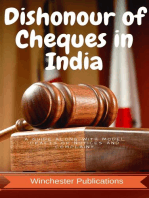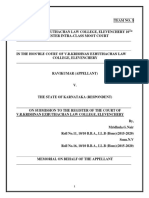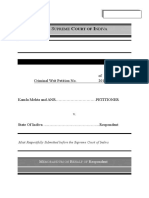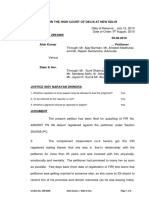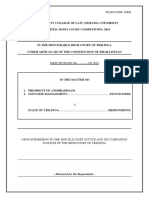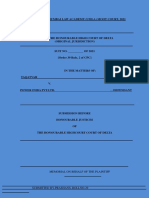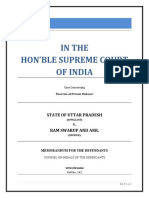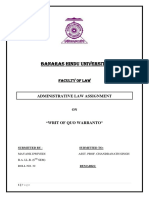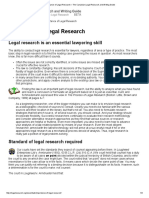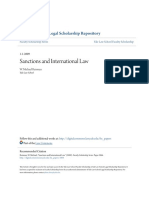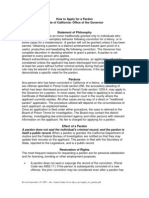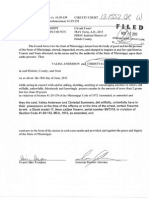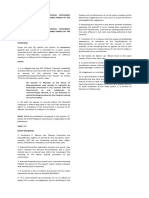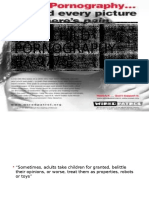Before The Hon'Ble High Court of Orissa: N HE Atter F
Before The Hon'Ble High Court of Orissa: N HE Atter F
Uploaded by
rahul1996Copyright:
Available Formats
Before The Hon'Ble High Court of Orissa: N HE Atter F
Before The Hon'Ble High Court of Orissa: N HE Atter F
Uploaded by
rahul1996Original Description:
Original Title
Copyright
Available Formats
Share this document
Did you find this document useful?
Is this content inappropriate?
Copyright:
Available Formats
Before The Hon'Ble High Court of Orissa: N HE Atter F
Before The Hon'Ble High Court of Orissa: N HE Atter F
Uploaded by
rahul1996Copyright:
Available Formats
BEFORE THE HON’BLE HIGH COURT OF ORISSA
IN THE MATTER OF:
RABINDRA ... APPELLANT
V.
STATE OF ORISSA ... RESPONDENT
ON SUBMISSION TO THE HON’BLE HIGH COURT OF ORISSA
UNDER ARTICLE 374(2) OF THE CODE OF CRIMINAL PROCEDURE
WRITTEN SUBMISSIONS ON BEHALF OF THE APPELLANT
COUNSEL APPEARING ON BEHALF OF THE APPELLANT
TABLE OF CONTENTS
DESCRIPTION PAGE NO
1. LIST OF ABBREVIATIONS 3
2. INDEX OF AUTHORITIES 4
3. STATEMENT OF JURISDICTION 5
4. STATEMENT OF FACTS 6
5. ISSUES INVOLVED 7
6. SUMMARY OF ARGUMENTS 7
7. ARGUMENTS ADVANCED 8
8. PRAYER 12
MEMORANDUM ON BEHALF OF THE APPELLANT Page 2
LIST OF ABBREVIATIONS
AIR All India Reporter
SCC Supreme Court Cases
SC Supreme Court
Cr.P.C Code of Criminal Procedure
IPC Indian Penal Code
Sec. Section
U/S Under Section
Ed. Edition
V. Versus
Vol. Volume
& And
Anr. Another
HC High Court
Suppl Supplement
Ors. Others
Cr.L.J Criminal Law Journal
FIR First Information Report
MEMORANDUM ON BEHALF OF THE APPELLANT Page 3
INDEX OF AUTHORITIES
STATUTES REFERRED
1. The Code of Criminal Procedure, 1973 [Act No. 2 of 1974]
2. The Indian Penal Code, 1860 [Act No. XLV of 1860]
3. The Indian Evidence Act, 1872 [Act No. 1 of 1872]
BOOKS AND ARTICLES
Indian Penal Code, 1860 by S. N. Mishra
Indian Penal Code, 1860 by K. D. Gaur
Indian Penal Code, 1860 by Ratanlal & Dhirajlal
Indian Penal Code, Pillai
The Indian Evidence Act, Batuklal
Code of Criminal Procedure, 1973 by Dr. N. V. Paranjape
Criminal Procedure, (5th Ed. 2011) by R.V. Kelkar
INTERNET SOURCES
1. www.manupatra.com
2. www.scc.com
3. www.indiankanoon.com
CASES REFERRED
Deva v/s State of Rajasthan
Sharad Birdichand Sharda v. State of Maharashtra
State of U.P. v. Ashok Kumar Srivastava
Rajnikantakesh Bhandari v. State AIR 1967 Goa 21 56
MEMORANDUM ON BEHALF OF THE APPELLANT Page 4
STATEMENT OF JURISDICTION
The instant appeal lies to the Hon’ble High Court of Orissa against the conviction in a trial
held by The Learned Sessions Judge in accordance with Section 374(2) of the Code of
Criminal Procedure, 1973.
Section 374 of The Code Of Criminal Procedure, 1973
374. Appeals from convictions.
(1) Any person convicted on a trial held by a High Court in its extraordinary original
criminal jurisdiction may appeal to the Supreme Court.
(2) Any person convicted on a trial held by a Sessions Judge or an Additional Sessions
Judge; or on a trial held by any other Court in which a sentence of imprisonment for more
than seven years has been passed; [against him or against any other person convicted at the
same trial], may appeal to the High Court.
(3) Save as otherwise provided in sub- section (2), any person,-
(a) convicted on a trial held by a Metropolitan Magistrate or Assistant Sessions Judge or
Magistrate of the first class, or of the second class, or
(b) sentenced under section 325, or
(c) in respect of whom an order has been made or a sentence has been passed under section
360 by any Magistrate, may appeal to the Court of Session.
MEMORANDUM ON BEHALF OF THE APPELLANT Page 5
___________________________________________________________________________
SYNOPSIS OF FACTS
___________________________________________________________________________
The deceased Mr. Ramaswami and the accused Mr Rabindra had a long standing property
dispute since about 12 years.
23.12.2017: The body of the deceased Mr. Ramaswami was recovered from near a pond
situated 2 k.m. away from the place of occurrence.
The incriminating weapon, a ‘bhujali’, was recovered basing on the statement of the accused
while in police custody from inside the said pond.
24.12.2017 : The accused Rabindra was arrested by the IIC, Rajendra Nagar Police Station.
26.________: Charge Sheet was submitted.
Autopsy report revealed that the death might have been caused due to run over by a vehicle
and there was a mark of violence on the body of the deceased.
Witnesses PW1 and PW2 stated that the accused was not present in the town on the date of
occurrence.
Order of the Learned Sessions Judge was that the accused Mr. Rabindra was found guilty
under Section 302 of the Indian Penal Code, 1860, and therefore sentenced him to undergo
imprisonment for 10 years along with a fine of Rs 20,000.
MEMORANDUM ON BEHALF OF THE APPELLANT Page 6
___________________________________________________________________________
ISSUES INVOLVED
___________________________________________________________________________
ISSUE 1-
WHETHER THE CONVICTION ORDER PASSED BY THE LEARNED SESSIONS
JUDGE IS TENABLE IN THE EYES OF LAW?
SUMMARY OF ARGUMENT
___________________________________________________________________________
ISSUE 1-
WHETHER THE CONVICTION ORDER PASSED BY THE LEARNED SESSIONS
JUDGE IS TENABLE IN THE EYES OF LAW?
The conviction order passed by the Learned Sessions Judge is not tenable in the eyes of law.
The appeal is preferred before this Hon’ble High Court of Orissa.
It is most humbly submitted that in the present case, the conviction order passed by the
Learned Trial Court is not tenable in the eyes of law because of the following contentions:
1. The burden of proving the guilt of the accused beyond all reasonable doubts
completely depends upon the prosecution and the prosecution has failed to do so.
There are enough cogent and clear doubts that arise from the case of the prosecution
and prove that the accused has not committed the crime.
2. The prosecution has put forward no eye-witness to the incident and the case, being
purely based on circumstantial evidence, the prosecution has failed to establish a clear
and cogent chain of circumstances linking the accused with the crime.
MEMORANDUM ON BEHALF OF THE APPELLANT Page 7
___________________________________________________________________________
ARGUMENTS ADVANCED
___________________________________________________________________________
WHETHER THE CONVICTION ORDER PASSED BY THE LEARNED SESSIONS
JUDGE IS TENABLE IN THE EYES OF LAW?
It is most respectfully submitted that the accused Mr. Rabindra has wrongly been
convicted under Sections 302 of the Indian Penal Code, 1860 to undergo imprisonment for
10 years along with a fine of Rs. 20,000 for the death of Mr. Ramaswami.
The basic rule of a criminal trial states that the court shall scan the evidence carefully
and minutely in order to find out whether there is a legal evidence to connect the accused
with the commission of the crime. All the circumstances must conclusively establish the only
hypothesis that the accused alone committed the crime beyond all reasonable doubt.
According to Section 300 of IPC laid down certain ingredients which are essential for
its application. It states that Culpable homicide leads to murder when:
I. the act by which the death is caused is done with the intention of causing death, or
II. it is done with the intention of causing such bodily injury as the offender knows to be
likely to cause the death of the person to whom the harm is caused.
III. it is done with the intention of causing bodily injury to any person and the bodily
injury intended to be inflicted is sufficient in the ordinary course of nature to cause death.
IV. the person committing the act knows that it is so imminently dangerous that it must, in
all probability, cause death or such bodily injury as is likely to cause death, and commits such
act without any excuse for incurring the risk of causing death or such injury as aforesaid.
It is most respectfully submitted that in the present case, the Learned Trial Court has
erred in convicting the accused person without carefully looking into the evidences put
forward by the prosecution.
Proof of guilt of accused beyond reasonable doubt
It is most humble submitted before the court that in all cases of homicide, the prosecution is
required to give satisfactory proof of the corpus delicit, it must prove that the deceased was
MEMORANDUM ON BEHALF OF THE APPELLANT Page 8
murdered. The prosecution has then to prove that the accused is the person who murdered the
deceased and no one else1.
In the present case the death body of the victim was recovered near a pond situated 2 km
away from the place of murder and the murder weapon was found near the pond. There is no
link between the place of occurrence and the place where incriminating material was
recovered.
Law is well settled that where a case rests squarely on circumstantial evidence, the
inference of guilt can be justified only when all the incriminating facts and circumstances are
found to be incompatible with the innocence of the accused or the guilt of any other persons.
The five golden principles which constitute the PANCHSHEEL of the proof of a case based
on circumstantial evidence are laid down in the case of Sharad Birdichand Sharda v. State
of Maharashtra2 which reads as follows:
The following conditions must be fulfilled before a case against an accused can be said to be
fully established:
1) The circumstances from which the conclusion of guilt is to be drawn should be fully
established.
2) The facts so established should be consistent only with the hypothesis of the guilt of the
accused, that is to say, they should not be explainable on any other hypothesis except that the
accused is guilty.
3) The circumstances should be of a conclusive nature and tendency.
4) They should exclude every possible hypothesis except the one to be proved, and
5) There must be a chain of circumstances, so complete, as not to leave any reasonable
ground for the conclusion consistent with the innocence of the accused and must show that in
all human probability the act must have been done by the accused.
Where the case depends upon the conclusion drawn from circumstances, the
cumulative effect of the circumstances must be such as to negative the innocence of the
accused and bring the offences home beyond any reasonable doubt.
Sec. 27 of the Indian Evidence Act, 1872 reads:
1
Rajnikantakesh Bhandari v. State AIR 1967 Goa 21 56
2
AIR 1984 SC 1622
MEMORANDUM ON BEHALF OF THE APPELLANT Page 9
How much of information received from accused may be proved.—Provided
that, when any fact is deposed to as discovered in consequence of information
received from a person accused of any offence, in the custody of a police officer, so
much of such information, whether it amounts to a confession or not, as relates
distinctly to the fact thereby discovered, may be proved.
The incriminating weapon found as per the statement of the accused while in custody
was the only point on which the entire case has been based.The fact that the weapon was
discovered in the said way is not enough proof to show that the accused was guilty of the
crime.These statements of the witnesses are ambiguous and unclear and do not form a chain
of circumstances pointing clearly to the guilt of the accused.
In the case of Deva v/s State of Rajasthan3, it was held that-“Merely because the
recovery of the knife was at the instance of the accused, it cannot be said that the accused was
the perpetrator of the crime.”
In State of U.P. v. Ashok Kumar Srivastava 4, it was pointed out that great care must be
taken in evaluating circumstantial evidence and if the evidence relied on is reasonably
capable of two inferences, the one in favour of the accused must be accepted
In the present case, the evidence relied upon are the recovery of the weapon and the
long standing dispute between the accused and the deceased. Thus, the evidence which stands
for the accused should be accepted.
It is most humbly submitted that in the present case, there is no chain of
circumstances established at all that could connect the accused to the crime. In a case basing
on circumstantial evidence where the chain of circumstances is not established clearly, the
accused is entitled to go scot-free.
But considering the present case, it is not so. The circumstances here are neither
consistent with the guilt of the accused and nor are they inconsistent with his innocence and
thus, the accused is entitled to the benefit of doubt.
Absence of eye witness
3
Deva v/s State of Rajasthan nov 17th 1998
4
(1992) Crl.L.J. 104
MEMORANDUM ON BEHALF OF THE APPELLANT Page 10
With reference to fact in record it is humbly submitted before this Hon’ble Court that
there is no witness that could provide substantial evidence for the commission of the acts by
the accused. The circumstantial evidence produced by the prosecution is not enough in the
eye of law for proper conviction.
In the present case in hand, the prosecution has completely failed in its attempt to
charge the accused of the aforementioned offences. The entire case is made up on baseless
and frivolous allegations.
The main points raised by the prosecution are-
1. The simple fact that the accused and the deceased had a long standing land dispute.
2. The incriminating weapon was discovered from inside the pond basing on the statement of
the accused while in custody.
As required by Criminal Jurisprudence, the facts and evidences in a case should be in
clear and unambiguous terms. In the present case, the facts and evidences are not satisfactory.
The prosecution has failed in its duty to prove the accused guilty.
There is no point put forward by the prosecution that could firmly establish the fact
that the accused was connected to the crime. The case of the prosecution is based on false and
concocted stories as there was no eyewitness and the alleged accused person was not present
at the place of murder.
It is thus, most humbly submitted that the Learned Sessions Judge, has erred in
convicting the accused under Sections 302 of The Indian Penal Code, 1860.
MEMORANDUM ON BEHALF OF THE APPELLANT Page 11
___________________________________________________________________________
PRAYER
___________________________________________________________________________
It is therefore prayed that this Hon’ble High Court of Orissa may graciously be
pleased to allow this appeal after hearing both the sides and may set aside the impugned
conviction order passed by the Learned Sessions Court and set the appellant free of the
charges framed;
And/or
Again further be pleased to pass any order/orders, direction/directions as it
may deem fit and proper in the interest of justice, equity and good conscience;
And for this act of kindness, the appellant as in duty bound shall ever pray.
Respectfully submitted on behalf of the appellant
Counsel for the appellant
MEMORANDUM ON BEHALF OF THE APPELLANT Page 12
You might also like
- Essential Soft Skills for Lawyers: What They Are and How to Develop ThemFrom EverandEssential Soft Skills for Lawyers: What They Are and How to Develop ThemNo ratings yet
- Moot PrepositionDocument23 pagesMoot PrepositionTushti DhawanNo ratings yet
- Respondent Kalka DeviDocument17 pagesRespondent Kalka DeviKalpita SahaNo ratings yet
- Petitioner MemoDocument16 pagesPetitioner MemoAbhishek singhNo ratings yet
- Dishonour of Cheques in India: A Guide along with Model Drafts of Notices and ComplaintFrom EverandDishonour of Cheques in India: A Guide along with Model Drafts of Notices and ComplaintRating: 4 out of 5 stars4/5 (1)
- Criminal Law OutlineDocument19 pagesCriminal Law OutlineThomas Jefferson100% (3)
- Caniza v. CADocument4 pagesCaniza v. CAJoshua Quentin Tarcelo100% (3)
- Kuldeep Singh (Respondent) MemorialDocument14 pagesKuldeep Singh (Respondent) MemorialwaheedNo ratings yet
- Moot Court and InternshipDocument13 pagesMoot Court and InternshipPiyush RanjanNo ratings yet
- MemorialDocument20 pagesMemorialKUNAL1221100% (1)
- Moot MemorialDocument16 pagesMoot MemorialChhatreshNo ratings yet
- 0 - 1601998074625 - Final Moot Memo.Document14 pages0 - 1601998074625 - Final Moot Memo.Littz MandumpalaNo ratings yet
- The Moot CourtDocument24 pagesThe Moot CourtSpriha ShreyaNo ratings yet
- Memorial Reprint PDFDocument15 pagesMemorial Reprint PDFSinghNo ratings yet
- Defendant Memorial.Document26 pagesDefendant Memorial.shivang rawatNo ratings yet
- RESPONDENT Side MemorialDocument29 pagesRESPONDENT Side MemorialLata Khanna100% (1)
- RespondentDocument26 pagesRespondentAditya Yash VyasNo ratings yet
- Azs Mining Pvt. Ltd. Co & Anr. (Petitioner) v. Union of Aryavarta & Anr. (Respondent)Document25 pagesAzs Mining Pvt. Ltd. Co & Anr. (Petitioner) v. Union of Aryavarta & Anr. (Respondent)Yasaschandra DevarakondaNo ratings yet
- Raghavendra Phadnis Moot 2013 - Problems PDFDocument9 pagesRaghavendra Phadnis Moot 2013 - Problems PDFUNIVERSITY LAW COLLEGE BHUBANESWARNo ratings yet
- Joydeep Neogi Vs State of West BengalDocument26 pagesJoydeep Neogi Vs State of West BengalSnigdha MazumdarNo ratings yet
- Compulsory Moot - VishalDocument18 pagesCompulsory Moot - Vishaldishu kumar100% (1)
- Memorial - FL 01 - PetitionerDocument33 pagesMemorial - FL 01 - PetitionerJoshua SamuelNo ratings yet
- In The Hon'Ble Supreme Court of India: (Criminal Appellate Jurisdiction)Document18 pagesIn The Hon'Ble Supreme Court of India: (Criminal Appellate Jurisdiction)Sarah KosarNo ratings yet
- Respondent Side MemorialDocument6 pagesRespondent Side MemorialNikita GuptaNo ratings yet
- Uday Moot RespondantDocument27 pagesUday Moot RespondantNEERAJ YADAV100% (1)
- Alok Kumar Vs StateDocument8 pagesAlok Kumar Vs StateHarsh SrivastavaNo ratings yet
- Moot Court Assingment 2 Petitioner Final Raj Vardhan AgarwalDocument13 pagesMoot Court Assingment 2 Petitioner Final Raj Vardhan Agarwalraj vardhan agarwalNo ratings yet
- 1.1 CivilDocument10 pages1.1 CivilSIMRAN PRADHANNo ratings yet
- Moot Court 3rd - Sampat v. Phad Behalf of PetitionerDocument13 pagesMoot Court 3rd - Sampat v. Phad Behalf of Petitionersampat phad100% (1)
- Moot MemorialDocument15 pagesMoot MemorialSiddhi WarkhadeNo ratings yet
- National Moot Court Competition 15 - 17, Oct., 2020: 10th EDITION (Virtual Competition)Document6 pagesNational Moot Court Competition 15 - 17, Oct., 2020: 10th EDITION (Virtual Competition)AnukritiNo ratings yet
- Army Institute of Law National Moot Court Competition 2016: Team Code: Ck9Document45 pagesArmy Institute of Law National Moot Court Competition 2016: Team Code: Ck9Abdul Qadir Juzer AeranpurewalaNo ratings yet
- Ou Moot Respondent Final 2019 PDFDocument25 pagesOu Moot Respondent Final 2019 PDFsriNo ratings yet
- Plaintiff Roll No 29Document20 pagesPlaintiff Roll No 29atipriyaNo ratings yet
- SOA National Institute of Law (SNIL) Moot Court, Paper Code-Lm 328Document15 pagesSOA National Institute of Law (SNIL) Moot Court, Paper Code-Lm 328Manaswini GajendraNo ratings yet
- Memorandum On Behalf of Respondent IlnuDocument15 pagesMemorandum On Behalf of Respondent IlnuNimrat kaurNo ratings yet
- Class MootDocument19 pagesClass MootAdvitya SambyalNo ratings yet
- Memorial Respondent SideDocument14 pagesMemorial Respondent Sidegeethu sachithanandNo ratings yet
- MZLC Moot Memorial Respondent (Restitution of Conjugal Rights)Document16 pagesMZLC Moot Memorial Respondent (Restitution of Conjugal Rights)Linta100% (2)
- Moot Court 1Document27 pagesMoot Court 1pyaar passionNo ratings yet
- Appellant MemorialDocument31 pagesAppellant MemorialSrishti Punj0% (1)
- KJNMC 32PDocument22 pagesKJNMC 32Pbbbbb100% (1)
- Tryst Moot Court Competition 2015: For Offences Charged Under: Section 302 of The Indian Penal Code, 1860Document28 pagesTryst Moot Court Competition 2015: For Offences Charged Under: Section 302 of The Indian Penal Code, 1860Ajay KandhariNo ratings yet
- State of UP v. Ram SwarupDocument16 pagesState of UP v. Ram SwarupShadan SyedNo ratings yet
- CMR Vi National Moot Court Competition, 2018: Team Code: 15PDocument20 pagesCMR Vi National Moot Court Competition, 2018: Team Code: 15PAnurag Sushant100% (2)
- MEMORIAL RESPONDENT FinalDocument55 pagesMEMORIAL RESPONDENT FinalGhanshyam GaurNo ratings yet
- Surana Moot PDFDocument14 pagesSurana Moot PDFKRISHNA VIDHUSHANo ratings yet
- Final RespondentMemo. D.Y.Patil MootDocument29 pagesFinal RespondentMemo. D.Y.Patil MootAayush Sinha100% (1)
- ApprovedDocument26 pagesApprovedyatharth khuranaNo ratings yet
- Statement of JurisdictionDocument23 pagesStatement of JurisdictionAkhil SreenadhNo ratings yet
- Memorial RespondentDocument27 pagesMemorial RespondentChirag YadavNo ratings yet
- AbbreviationsDocument2 pagesAbbreviationskullsNo ratings yet
- Honour Killing Case - RESPONDENTDocument18 pagesHonour Killing Case - RESPONDENTashwani kumarNo ratings yet
- Petitioner Moot Problem 1Document23 pagesPetitioner Moot Problem 1Mukesh SinghNo ratings yet
- SCILvMBPL CaseAnalysisDocument5 pagesSCILvMBPL CaseAnalysisAbhishek RaiNo ratings yet
- SDSM'S Law College Moot Court Competition, 2022 Team CodeDocument13 pagesSDSM'S Law College Moot Court Competition, 2022 Team CodeNishant JasaniNo ratings yet
- Moot Memorial On Behalf of PetitionerDocument21 pagesMoot Memorial On Behalf of PetitionerArjun ChakladarNo ratings yet
- Moot Court Memorial - AppellantDocument33 pagesMoot Court Memorial - Appellantvidhanshuthakur0% (1)
- TC 19PDocument19 pagesTC 19Pprateek7891078341No ratings yet
- Group Memorial PDFDocument15 pagesGroup Memorial PDFKanu Priya Gupta100% (1)
- FINAL Appellant MemoDocument22 pagesFINAL Appellant Memonaman agrawalNo ratings yet
- Doctrine of Res Judicata - Ayush Kumar SinghDocument11 pagesDoctrine of Res Judicata - Ayush Kumar SinghAyush Kumar SinghNo ratings yet
- 75 Romero La Bugal Blaan V RamosDocument2 pages75 Romero La Bugal Blaan V RamosLouie SalladorNo ratings yet
- Partnership & Agency Reviewer Aquino Summary - Edward ArribaDocument17 pagesPartnership & Agency Reviewer Aquino Summary - Edward ArribaJerry Louise Huerbana0% (1)
- Draft Employment ContractDocument2 pagesDraft Employment Contractadelainezernagmail.comNo ratings yet
- Digest - Manila Memorial vs. DSWDDocument1 pageDigest - Manila Memorial vs. DSWDApril Boreres100% (1)
- Og 94033Document611 pagesOg 94033brucewayne33No ratings yet
- Al-Ameen College of Law: Important Question With Answers December - 2018Document67 pagesAl-Ameen College of Law: Important Question With Answers December - 2018rohanNo ratings yet
- Contempt - Pulumbarit v. CA To Oca v. Custodio - BeldadDocument12 pagesContempt - Pulumbarit v. CA To Oca v. Custodio - BeldadBernadette Luces BeldadNo ratings yet
- Banaras Hindu University: Administrative Law AssignmentDocument15 pagesBanaras Hindu University: Administrative Law AssignmentMayank DwivediNo ratings yet
- Adversary Cover SheetDocument2 pagesAdversary Cover SheetLoretta SmithNo ratings yet
- 15) Importance - of - Legal - Research PDFDocument3 pages15) Importance - of - Legal - Research PDFIbrahim ShaikhNo ratings yet
- Select Indian & Foreign Legal Articles: PpendixDocument66 pagesSelect Indian & Foreign Legal Articles: PpendixMAHANTESH GNo ratings yet
- Sanctions and International LawDocument13 pagesSanctions and International LawMarch Ellene100% (1)
- PleadingsDocument15 pagesPleadingsRandy SiosonNo ratings yet
- U.S. v. Dylann RoofDocument31 pagesU.S. v. Dylann RoofHoward FriedmanNo ratings yet
- A-1 Financial Services, Inc. vs. Atty. Laarni ValerioDocument2 pagesA-1 Financial Services, Inc. vs. Atty. Laarni ValerioEricka Caballes100% (2)
- Bilal Ahmed Kaloo Vs State of Andhra Pradesh On 6 August, 1997Document6 pagesBilal Ahmed Kaloo Vs State of Andhra Pradesh On 6 August, 1997ar15t0tleNo ratings yet
- RULEs 41 Cases - MontonDocument11 pagesRULEs 41 Cases - MontonRen ConchaNo ratings yet
- Larson V Money Control Inc Christopher Clarkson Riverside California FDCPA ComplaintDocument8 pagesLarson V Money Control Inc Christopher Clarkson Riverside California FDCPA ComplaintghostgripNo ratings yet
- Florida Hambook 2017Document5,007 pagesFlorida Hambook 2017ArnoldoPoveda100% (2)
- California Pardon Procedure Darren ChakerDocument5 pagesCalifornia Pardon Procedure Darren ChakerDarren ChakerNo ratings yet
- Rivera vs. CSCDocument3 pagesRivera vs. CSCMarielNo ratings yet
- Chris Summers RedactedDocument38 pagesChris Summers Redactedthe kingfishNo ratings yet
- Marcos Vs Chief of Staff DigestDocument1 pageMarcos Vs Chief of Staff DigestJan Mar Gigi GallegoNo ratings yet
- Anti Child PornographyDocument21 pagesAnti Child PornographyDali MaliamanNo ratings yet
- 2009 - 2011 Criminal Procedure Bar Q&ADocument5 pages2009 - 2011 Criminal Procedure Bar Q&ATheo Miguel Agravante Ballesteros100% (2)
- Graciano H. Arinday, Jr. For Petitioners. Antonio L. Balinas For RespondentDocument3 pagesGraciano H. Arinday, Jr. For Petitioners. Antonio L. Balinas For Respondentcassandra leeNo ratings yet
- Summary & Extrajudicial Killings in The PhilippinesDocument10 pagesSummary & Extrajudicial Killings in The PhilippinesMayeth Maceda75% (4)




